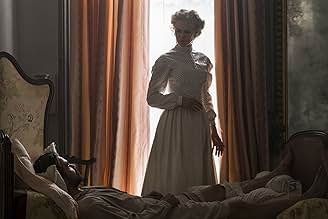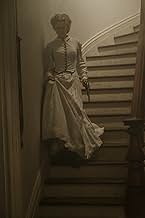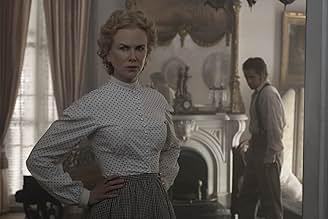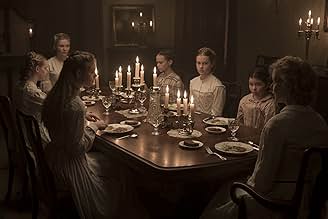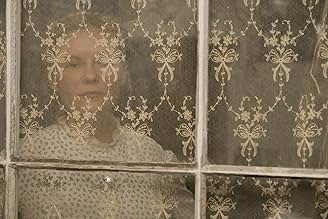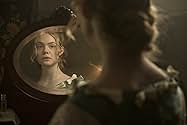VALUTAZIONE IMDb
6,3/10
65.127
LA TUA VALUTAZIONE
L'arrivo inaspettato di un soldato dell'Unione gravemente ferito ad una scuola per sole ragazze in Virginia durante la guerra civile scatenerà un vespaio di gelosia e tradimenti.L'arrivo inaspettato di un soldato dell'Unione gravemente ferito ad una scuola per sole ragazze in Virginia durante la guerra civile scatenerà un vespaio di gelosia e tradimenti.L'arrivo inaspettato di un soldato dell'Unione gravemente ferito ad una scuola per sole ragazze in Virginia durante la guerra civile scatenerà un vespaio di gelosia e tradimenti.
- Regia
- Sceneggiatura
- Star
- Premi
- 5 vittorie e 26 candidature totali
Wayne Pére
- Captain
- (as Wayne Pere)
Rebecca Hyland
- Mrs. Scurry
- (non citato nei titoli originali)
Eric Ian
- Confederate Soldier
- (non citato nei titoli originali)
Recensioni in evidenza
Sofia Coppola's capacity to create beautiful shots in incredible settings, and capture actors' specific beauty is unquestionable. Finding depth in her characters is a different story. A new take on a old tale, the actors in the Beguiled fail to get us to actually care about any of them and, as a consequence, their fate in the story.
I'm going to try to be very delicate with expressing my following (strong) opinion because it seems like the film has quite a lot of fans on here, but watching The Beguiled was the most surprising film experience I've had in years. I'm surprised anyone would even think of remaking it, I'm even more surprised that someone is Sofia Coppola, and I'm most surprised its gotten favorable reviews and any positive attention whatsoever.
When I watch a film I think is good or successful in some way, I don't necessarily think back to its themes or what it was trying to tell me. I feel it and it doesn't need to be something explicit I check off. But it's definitely noticeable when you feel absolutely nothing for a film. I am utterly at a loss as to what the point of The Beguiled was. What was it trying to say? What were its themes? Jessica Chastain's comment at Cannes must have been directed towards this in particular, because it proves that a film starring several women does not mean it has any feminist themes whatsoever. The Beguiled comes across as very hateful and sexist in general, painting no gender in any positive light and definitely portraying women in a very negative way. It's a period film, sure, but what was its intention? What was it trying to say? Did it really just go over my head? As far as I'm concerned, it's absolute trash. Not only is it problematic, the filmmaking isn't even that good either. There are some nice shots here and there, but much of the cinematography is awkward and unambitious and the editing pretty disjointed. As for the performances? Colin Farrell was pretty terrible in the third act, and while Dunst, Fanning, and Kidman weren't bad, their characters didn't allow them to be anything of note. I am particularly shocked at the buzz for Kidman. She did absolutely nothing of worth.
I'm not asking for a film to be explicit in its themes or character intentions. This film wasn't even ambiguous in any sort of way. The character arcs (if you can call them that) were wholly unsatisfying. 90 minutes later and I still wasn't sure who these people were. More than anything, the film didn't know what it wanted to be. If it wanted to be an art-house drama, it failed. At least had it become an entirely trashy thriller it may have been more enjoyable. The filmmaking is mediocre, the storyline dull, and the implications very problematic.
Since I know there are people who liked it, I really am just wondering if anyone would be kind enough to post why they liked it. What did I miss? How was this film even conceived and remade? What was its point? I haven't been so surprised and disappointed by a film in years, and it's shocking to me that this was made by the same person that made The Virgin Suicides and Lost in Translation. I guess I am more inclined than ever to read its positive reviews. More than wondering how anyone could find it enjoyable and all that (which is a very subjective opinion), I really want to understand how this could be anything other than completely sexist.
When I watch a film I think is good or successful in some way, I don't necessarily think back to its themes or what it was trying to tell me. I feel it and it doesn't need to be something explicit I check off. But it's definitely noticeable when you feel absolutely nothing for a film. I am utterly at a loss as to what the point of The Beguiled was. What was it trying to say? What were its themes? Jessica Chastain's comment at Cannes must have been directed towards this in particular, because it proves that a film starring several women does not mean it has any feminist themes whatsoever. The Beguiled comes across as very hateful and sexist in general, painting no gender in any positive light and definitely portraying women in a very negative way. It's a period film, sure, but what was its intention? What was it trying to say? Did it really just go over my head? As far as I'm concerned, it's absolute trash. Not only is it problematic, the filmmaking isn't even that good either. There are some nice shots here and there, but much of the cinematography is awkward and unambitious and the editing pretty disjointed. As for the performances? Colin Farrell was pretty terrible in the third act, and while Dunst, Fanning, and Kidman weren't bad, their characters didn't allow them to be anything of note. I am particularly shocked at the buzz for Kidman. She did absolutely nothing of worth.
I'm not asking for a film to be explicit in its themes or character intentions. This film wasn't even ambiguous in any sort of way. The character arcs (if you can call them that) were wholly unsatisfying. 90 minutes later and I still wasn't sure who these people were. More than anything, the film didn't know what it wanted to be. If it wanted to be an art-house drama, it failed. At least had it become an entirely trashy thriller it may have been more enjoyable. The filmmaking is mediocre, the storyline dull, and the implications very problematic.
Since I know there are people who liked it, I really am just wondering if anyone would be kind enough to post why they liked it. What did I miss? How was this film even conceived and remade? What was its point? I haven't been so surprised and disappointed by a film in years, and it's shocking to me that this was made by the same person that made The Virgin Suicides and Lost in Translation. I guess I am more inclined than ever to read its positive reviews. More than wondering how anyone could find it enjoyable and all that (which is a very subjective opinion), I really want to understand how this could be anything other than completely sexist.
This film does have a distinct visual appeal to it, as well as overall solid performances. However, the underlying tension that Coppola I think was going for doesn't really materialize. Instead the viewer is left with feelings of frustration because we know what we're supposed to be feeling, or what we think we should, but the director just can't make it happen. In part this is due to her going for style in place of substance, when these need not be mutually exclusive.
A double-bill of THE BEGUILED, Thomas Cullinan's source novel is a civil-war drama positing a tantalizing scenario where a wounded union soldier fetches up in a southern all-girls' school, nurtured to recovery by the apparently good-willed women but also subjected to temptations from female gazes and one false move, he will go through purgatory of his sorry life.
The 1971 version is directed by Don Siegel, the third of his five collaborations with Clint Eastwood, who plays the Yankee Corporal John McBurney, and is discovered by a 12-year-old Amy (Ferdin, an absorbing talent), to whom he indulges with a peck on her lips, a blatant way to take away a child's first kiss (also pretty provocative by today's regressive yardstick), instantly, what Siegel hammers home to viewers is that he is not a humdinger, and through glimpses of fleeting flashback interleaved into the narrative, John emerges as a congenital liar, flippant and manipulative, currying favor from his petticoat accompany to slough from a possible fall of incarceration, whether it is Miss Marsha (Page), the headmistress of the seminary school, Edwina (Hartman), the virginal teacher to whom he claims his attraction, a nubile 17-year-old student Carol (Ann Harris), who is sexually active, even the slave Hallie (Mercer, a defiant soul hampered by her identity), cannot evade his come-ons.
The advent of a hot-blooded albeit bedridden male inevitably causes an erotic disruption among the exclusive distaff clique, whose members are circumspectly secluded from the battlefield merely outside their perimeter and sexually repressed, for pert, callow girls, they are inclined to project John as a perfect specimen of their untested sexual allure versus the opposite sex, in the cases of Edwina and Carol, one is the prudish committed type and the other is a wanton nymphet. But the most complex character amongst them is no doubt Miss Marsha, whose incest past and subliminal lesbian proclivity get a full treatment in the audacious script and visual presentation, the latter is even coalesced with a flagrant religious connotation to soup up the film's maverick idiom. When the crunches arrives, a man's conceit in his potency is punished by blunt castration and signifies a rude awakening of the priapic worship.
On top of his virile stallion credence, Clint Eastwood imbues a cunning, almost overweening facade which audience isn't familiar with, not cut from the same cloth from his hard-boiled tough-guy legend. Geraldine Page, emboldened by her matriarchal gravitas and demanding onus, doesn't shy away from any extraneous intrusion (the Union and the Confederacy alike) and builds a palpably beguiling tension through the mind games she plays with Eastwood yet holds the rein from stem to stern in unyielding resolution of taking the escalating situation in her own hands. Elizabeth Hartman, the fragile Oscar-nominated actress whose premature demise was a harrowing tragedy ripe for cinematic transposition, brings about something equally tangible and visceral as she is bedeviled by the discord between a man's promise and his action, but still holds out the last remaining benevolence out of her own impressionable nature.
Crowned BEST DIRECTOR in Cannes, Sofia Coppola's remake is an aesthetically beguiling psychological intrigue, superbly recreates a mystical Gothic quaintness in the closing days of the civil war entrapped within the terrain of a majestic mansion of the antebellum south, which certainly is a scintillating upgrade from the 1971 version's sepia retro flair.
But story-wise, Sofia's script not only eviscerates the role of Hallie (which is a double-edged sword since she claims that out of the respect of this sensitive issue, she doesn't want to tread lightly, but also can be easily accused of racially insensitive), but also leaves no allusions of all the taboo issues tackled in Siegel's movie, lesbian kiss, incest depravity and of course, that inappropriate kiss between a grown-up man and a teenage girl, are outright sanitized, and in fact, the whole story has been strenuously internalized, for instance, John's transgression, where is given a plausible justification in Siegel's film, is carried out in a slipshod manner, indicating that it is nothing less than a spur of horniness.
Atmospherical over dramatic, it is beyond reproach that Coppola opts to tell the allegory with her own agent, but unfortunately, the resultant impact doesn't meet up with expectation, especially when juxtaposed with its far more entrancing antecedent. Nicole Kidman intrepidly takes the mantle from Ms. Page, and actualizes an extremely sensual sponge-washing scene with Colin Farrell's less forthcoming and more sympathetic portrayal of a soldier turns paraplegic when he is subjected to an ambiguous retribution out of the necessity of saving his life. Kirsten Dunst and Elle Fanning don't make a splash in the shoes of Hartman and Ann Harris respectively, save Oona Laurence, whose Amy, precisely captures a child's malleable mentality.
So, the jury is out, the remake is humbled by the original, which is quite a shocker because on the paper, Coppola's feminine sensitivity seems to be more adept to parse this age-old gender axe battle than an action-inclined Mr. Siegel, again there is no sure thing in the film industry, and that is exactly why it keeps us intrigued every time.
The 1971 version is directed by Don Siegel, the third of his five collaborations with Clint Eastwood, who plays the Yankee Corporal John McBurney, and is discovered by a 12-year-old Amy (Ferdin, an absorbing talent), to whom he indulges with a peck on her lips, a blatant way to take away a child's first kiss (also pretty provocative by today's regressive yardstick), instantly, what Siegel hammers home to viewers is that he is not a humdinger, and through glimpses of fleeting flashback interleaved into the narrative, John emerges as a congenital liar, flippant and manipulative, currying favor from his petticoat accompany to slough from a possible fall of incarceration, whether it is Miss Marsha (Page), the headmistress of the seminary school, Edwina (Hartman), the virginal teacher to whom he claims his attraction, a nubile 17-year-old student Carol (Ann Harris), who is sexually active, even the slave Hallie (Mercer, a defiant soul hampered by her identity), cannot evade his come-ons.
The advent of a hot-blooded albeit bedridden male inevitably causes an erotic disruption among the exclusive distaff clique, whose members are circumspectly secluded from the battlefield merely outside their perimeter and sexually repressed, for pert, callow girls, they are inclined to project John as a perfect specimen of their untested sexual allure versus the opposite sex, in the cases of Edwina and Carol, one is the prudish committed type and the other is a wanton nymphet. But the most complex character amongst them is no doubt Miss Marsha, whose incest past and subliminal lesbian proclivity get a full treatment in the audacious script and visual presentation, the latter is even coalesced with a flagrant religious connotation to soup up the film's maverick idiom. When the crunches arrives, a man's conceit in his potency is punished by blunt castration and signifies a rude awakening of the priapic worship.
On top of his virile stallion credence, Clint Eastwood imbues a cunning, almost overweening facade which audience isn't familiar with, not cut from the same cloth from his hard-boiled tough-guy legend. Geraldine Page, emboldened by her matriarchal gravitas and demanding onus, doesn't shy away from any extraneous intrusion (the Union and the Confederacy alike) and builds a palpably beguiling tension through the mind games she plays with Eastwood yet holds the rein from stem to stern in unyielding resolution of taking the escalating situation in her own hands. Elizabeth Hartman, the fragile Oscar-nominated actress whose premature demise was a harrowing tragedy ripe for cinematic transposition, brings about something equally tangible and visceral as she is bedeviled by the discord between a man's promise and his action, but still holds out the last remaining benevolence out of her own impressionable nature.
Crowned BEST DIRECTOR in Cannes, Sofia Coppola's remake is an aesthetically beguiling psychological intrigue, superbly recreates a mystical Gothic quaintness in the closing days of the civil war entrapped within the terrain of a majestic mansion of the antebellum south, which certainly is a scintillating upgrade from the 1971 version's sepia retro flair.
But story-wise, Sofia's script not only eviscerates the role of Hallie (which is a double-edged sword since she claims that out of the respect of this sensitive issue, she doesn't want to tread lightly, but also can be easily accused of racially insensitive), but also leaves no allusions of all the taboo issues tackled in Siegel's movie, lesbian kiss, incest depravity and of course, that inappropriate kiss between a grown-up man and a teenage girl, are outright sanitized, and in fact, the whole story has been strenuously internalized, for instance, John's transgression, where is given a plausible justification in Siegel's film, is carried out in a slipshod manner, indicating that it is nothing less than a spur of horniness.
Atmospherical over dramatic, it is beyond reproach that Coppola opts to tell the allegory with her own agent, but unfortunately, the resultant impact doesn't meet up with expectation, especially when juxtaposed with its far more entrancing antecedent. Nicole Kidman intrepidly takes the mantle from Ms. Page, and actualizes an extremely sensual sponge-washing scene with Colin Farrell's less forthcoming and more sympathetic portrayal of a soldier turns paraplegic when he is subjected to an ambiguous retribution out of the necessity of saving his life. Kirsten Dunst and Elle Fanning don't make a splash in the shoes of Hartman and Ann Harris respectively, save Oona Laurence, whose Amy, precisely captures a child's malleable mentality.
So, the jury is out, the remake is humbled by the original, which is quite a shocker because on the paper, Coppola's feminine sensitivity seems to be more adept to parse this age-old gender axe battle than an action-inclined Mr. Siegel, again there is no sure thing in the film industry, and that is exactly why it keeps us intrigued every time.
In Civil War Virginia, wounded Union soldier McBurney (Colin Farrell) seeks shelter in the plantation house of Miss Martha (Nicole Kidman) who runs a school for young women. The war has reduced the student body to a handful of young girls and teenagers, and only one remaining teacher, Edwina (Kirsten Dunst). Vowing to nurse the injured man back to health before turning him in to the Confederate authorities, Miss Martha and the other girls all become enamored of the handsome soldier, with dire consequences.
Director Sofia Coppola seems to be striving for a Barry Lyndon-esque natural light look, with no artificial lighting used at all, resulting in lots of gloomy and shadows during the evening scenes. The sound design also goes for an antiquated natural quiet, with the sounds of crickets and wind moving through the trees dominating, adding to a sleepy, dreamy atmosphere. The performers are all fine, and I even thought Farrell fit the manipulative soldier role better than Clint Eastwood did in the previous film. The three central women characters are noticeably different, though, and I felt they were each less compelling than those in the earlier movie (Kidman = Geraldine Page, Kirstin Dunst = Elizabeth Hartman, and Elle Fanning = Jo Ann Harris). This isn't a terrible film, but there's not a lot to recommend going out of your way for it, either.
Director Sofia Coppola seems to be striving for a Barry Lyndon-esque natural light look, with no artificial lighting used at all, resulting in lots of gloomy and shadows during the evening scenes. The sound design also goes for an antiquated natural quiet, with the sounds of crickets and wind moving through the trees dominating, adding to a sleepy, dreamy atmosphere. The performers are all fine, and I even thought Farrell fit the manipulative soldier role better than Clint Eastwood did in the previous film. The three central women characters are noticeably different, though, and I felt they were each less compelling than those in the earlier movie (Kidman = Geraldine Page, Kirstin Dunst = Elizabeth Hartman, and Elle Fanning = Jo Ann Harris). This isn't a terrible film, but there's not a lot to recommend going out of your way for it, either.
Lo sapevi?
- QuizContrary to popular belief, McBurney's heritage was not changed to suit Colin Farrell's natural accent. The character is Irish in the book. Farrell was not initially going to use his Dublin accent but pushed to have the movie accurate to the original story.
- BlooperCorporal McBurney sets about sharpening a tool on a whetstone wheel in the garden during his rehabilitation. However, he spins the wheel towards himself as he begins to get it going. This is incorrect. The wheel should be spun away from the user, so that the tool "skims" over the surface, and doesn't have a chance of digging into the wheel and jamming the tool into the user.
- Citazioni
[from trailer]
John McBurney: [screaming] What have you done to me, you vengeful bitches?
- ConnessioniFeatured in Film '72: Episodio #46.4 (2017)
- Colonne sonoreLorena
Music by J.P. Webster (as Joseph Philbrick Webster)
Lyrics by Henry D.L. Webster
Performed by Oona Laurence (uncredited)
I più visti
Accedi per valutare e creare un elenco di titoli salvati per ottenere consigli personalizzati
- How long is The Beguiled?Powered by Alexa
Dettagli
- Data di uscita
- Paese di origine
- Siti ufficiali
- Lingue
- Celebre anche come
- El seductor
- Luoghi delle riprese
- Madewood Plantation - 4250 Highway 308, Napoleonville, Louisiana, Stati Uniti(main location, only exteriors)
- Aziende produttrici
- Vedi altri crediti dell’azienda su IMDbPro
Botteghino
- Budget
- 10.500.000 USD (previsto)
- Lordo Stati Uniti e Canada
- 10.709.995 USD
- Fine settimana di apertura Stati Uniti e Canada
- 229.292 USD
- 25 giu 2017
- Lordo in tutto il mondo
- 27.869.129 USD
- Tempo di esecuzione
- 1h 33min(93 min)
- Colore
- Mix di suoni
- Proporzioni
- 1.66 : 1
Contribuisci a questa pagina
Suggerisci una modifica o aggiungi i contenuti mancanti








